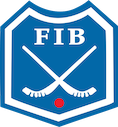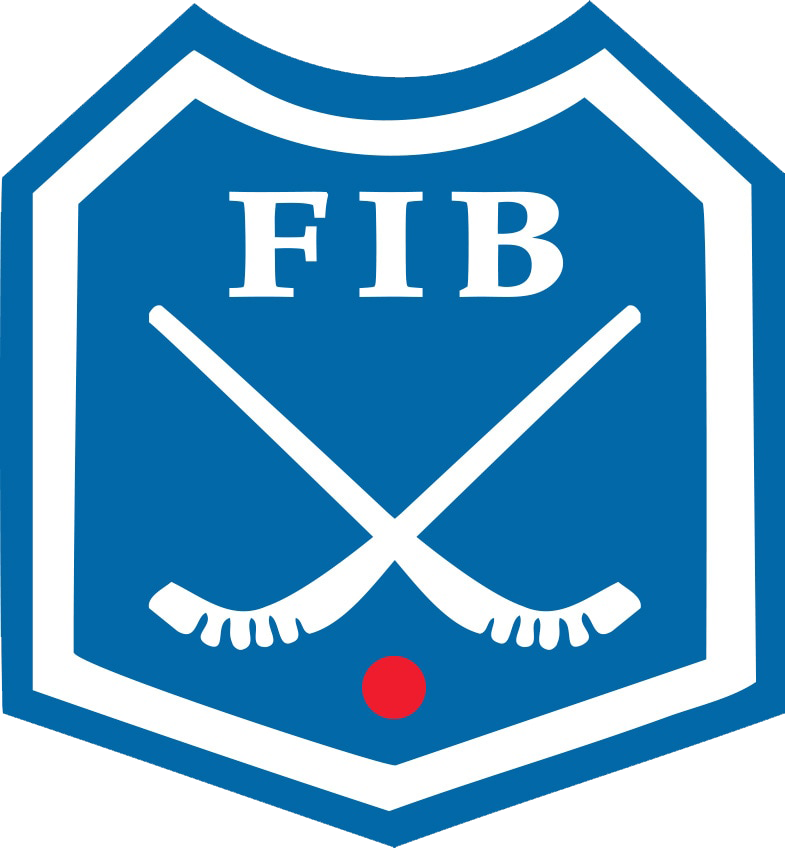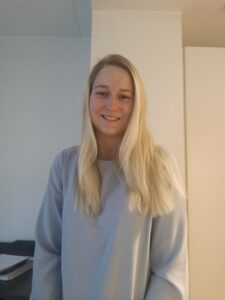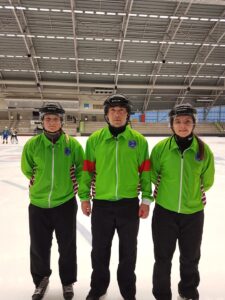MEET HANNA HANSSON!
Talented Swedish referee – already with great experiences!
When did you start as a referee and what made you do it?
– I attended my first district education when I went to the Bandy High School in Solna. After attending that course I was interested in testing to try. I had previously been a referee in the smaller type of bandy with only 7 players per team but the 11-player-bandy seemed more fun. I signed up for a course that was held in Stockholm in the beginning of the next season. I think it was 4 or 5 years ago. I worked as referee in the evenings and weekends on that season. It went very fast and I got matches on higher grade very quickly, which made it fun to continue.
What about your own experience as player?
-The first club was GT 76 when I was six years old, I think. I played in a boys team all the time. When I started high school I started playing in Hammarby, which I still do today. I think I played at most positions. I have never really had much to say about where I should play. I play where the coach think I am best suited, at first as a forward and then I moved around a bit. Now I’m a defender. I would say that my strengths as a player have been ice skating and to understand the game. I have been able to use that very much as a referee. I have also been able to use much of what I have learned as a referee to become a better player. You get a completely different view of the game when you can use both how players and referees see situations. It has especially helped me get less penalties!
How was your participation in World Championship this year?
– To go away and work during the B-group was very different. Previously I had three World Championships, but that was one Girls 17 and two women Championships. As a referee, I think it gave me a lot. To work in male games is completely different to women. Although the level was very mixed in various matches, there were a number of tough matches that required much from us referees.
Most difficult is the communication since many participants came from Russia and they are not so good in English. But there were still many English-speaking referees. Since this World Championship had more matches than earlier, there were more referees in place. It was very fun to meet so many referees from other countries and listen how the bandy works in their country and how the sport grows. We got a good cohesion in the group, which gives a lot when we work together on the ice.
What’s the most difficult thing about being a referee?
– It is a very difficult question. Many times it can be difficult to be satisfied with my own effort when players or leaders think that I have done a disastrous job. As a referee you usually get a lot of criticism from players, leaders and even audiences. But that does not mean you have made mistakes. As a player you can make mistakes all the time and the worst thing that happens is that your teammates get angry. As a referee you can make a small mistake or even just something that others are perceived as a mistake and then you have a whole team against you for the rest of the match.
It is a difficult job from the moment you come to the arena until you leave it. But if you think it is fun, then you do not let anything stop you from coming back the day after and do everything once again. I have received more criticism from players and leaders than I can remember. But as long as you stand up for what you do, it is easier than you think.
Do you exercise much physically?
– As much as I can, I should say. My team usually have 2-3 times with ice practice a week, that I usually attend. Then I have 2-3 matches as a referee a week and maybe even one as a player. During the winter, when the season is in full swing, I can’t do more than that. I also need to attend my education at the Royal Institute of Technology. As an average I could say that I almost end up in 8-10 hours a week on ice, with mixed intensity. The total time I spend on exercising is probably the double amount of hours than that.
What do you think you can develop most?
– There is a lot I can develop to get where I want as a referee. But one thing that I want to develop is how I look outward. I mean everything from how players perceive me when I enter the ice field to how I act in situations such as free strokes or corners. Body language is something that is very important. That is what I want to develop most, right now.
Now you have worked with both male and female players. What is the main difference?
– There is a very big difference. Male games are cleaner and usually easier to follow. It can almost feel like there is more thought behind the game and especially more discipline in the movements. Keeping the offside-line feels easier. There is more flow in how their defense line moves and there are almost the same player holding the line. Situations that happens are usually easier to see.
Women, however, do not have the same way to play. The women have not managed to remove all the collisions that occur in younger girl bandy. There are a lot of crashes that are hard to see if it really is just a collision or conscious collision. That is easier to assess in male matches.
When it comes to how players and leaders behave towards me as a female referee, it has changed very much. Earlier many were surprised when they saw that there was a female referee. I felt that I had to work extra to get acceptance both on and off the ice field. Now when there are more women referees, I feel that it’s not much of a problem. But there are still cases where you get criticism for being a female referee. Not because you have done something wrong. It is just something that you must accept and not take personally. It gets better and better all the time and it has taken big steps forward in recent years.
What is the difference between international matches and national?
– The biggest difference is the attitude. When it comes to international matches, everyone plays for their country. The emotions come out much more in international matches than in domestic ones. But for me as a referee it really doesn’t matter. I work in the same way. I does not matter, which team is playing, nor if I work in matches with a Swedish national team.
When you watch bandy games, can you be a regular spectator or do you focus more on the referees?
– I think I am usually a regular spectator. But off course I look more at the referees than other spectators might do. But sometimes I go to matches to look specifically at the referees. But it is always the whole thing you see, the match and the referees. But it often happens that I get questions about situations that occur on the ice. Sometimes I can answer, but often I do not know more than the others in the stands. I cannot see the situation in the same way as the referees on the ice.
What would you say to a girl who is thinking about becoming a referee?
– Sign up for the next district referee course and test any match. You will not know how it is until you have tested. It may seem scary or very difficult, but if you have played bandy yourself it will come by itself. The best thing about starting as a referee when still playing is that it makes one a better player. All the girls I have met who have tried it thought it was fun and have come into it very quickly. There is nothing negative that can come from trying it.
And finally, what is most fun with the job?
– The funniest thing is to get great experience. I have been allowed to travel to the USA, Russia and China at the World Championships. It has been incredible. I have also grown incredibly much as a person. I dare to do so much more than I did before. I used to be a pretty quiet girl who just talked if I had to. I can hardly see that person anymore, if I look at who I am now. I am very proud of what it has done to me.
– But most important of all, I have met amazing people, regardless it is a regular series match or World Championship. I have met many people from all parts of Sweden, but also from other parts of the world, and I do not want to change it to anything else. I have made fantastic friends from working as a referee, it is an important part of why I think it’s so much fun.



